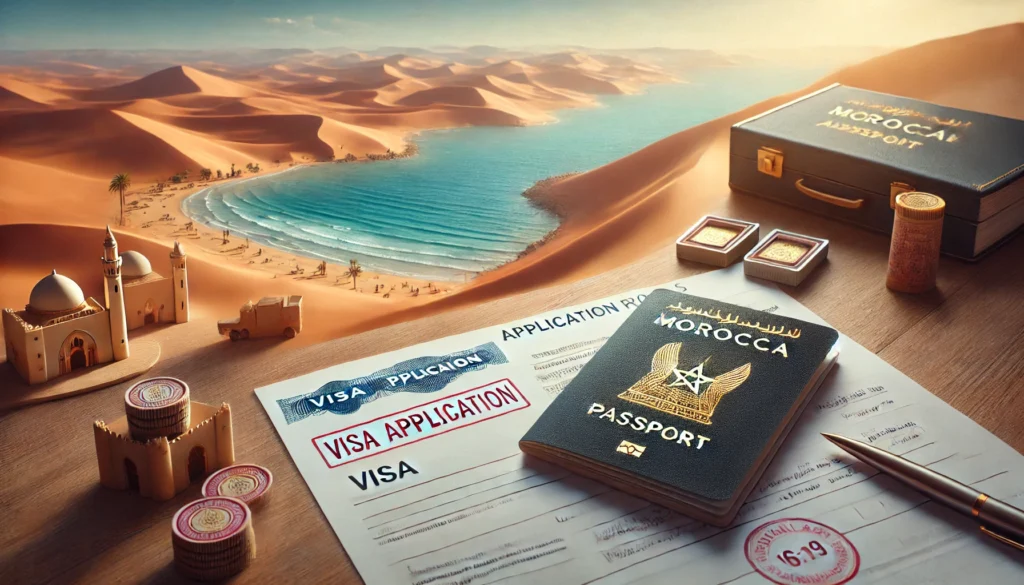
Introduction
Dakhla, a gem nestled in the Western Sahara (Morocco), captivates travelers with its breathtaking landscapes, rich culture, and unparalleled coastal beauty. This stunning destination, shaped by its unique geography, has become a haven for those seeking adventure, tranquility, and a taste of its vibrant heritage.
However, the political landscape of Western Sahara adds an extra layer of intrigue. With Morocco exercising control over most of the region, including Dakhla, the visa process for travelers is heavily influenced by Moroccan policies. Understanding the region’s complex jurisdiction helps simplify the planning process and ensures a smooth arrival.
In this guide, we’ll unravel the intricacies of navigating visa requirements for Dakhla, making it easier for you to plan your visit without unnecessary hurdles. From identifying visa-exempt countries to breaking down the application process for non-visa-exempt travelers, this comprehensive overview will equip you with all the information you need to embark on your journey to this serene destination.
Understanding Dakhla’s Visa Framework
Moroccan Jurisdiction Over Dakhla
Dakhla operates under Morocco’s administrative control, meaning that it follows Morocco’s visa policies. For travelers, this simplifies the process considerably, as there are no separate visa requirements specific to Dakhla—it is treated as part of Moroccan territory.
What This Means for Travelers
If you’re planning a trip to Dakhla, it’s essential to understand that the visa framework is identical to that of mainland Morocco. Whether you’re arriving by flight, land, or sea, your entry into Dakhla will hinge on meeting Morocco’s entry requirements. This consistency allows travelers to use Moroccan visas or visa exemptions across the region seamlessly.
By aligning its visa regulations with Morocco’s, Dakhla ensures a straightforward process for those seeking to explore its picturesque coastline, stunning desert landscapes, and vibrant local culture.
Visa-Exempt Countries
Travelers from certain countries are fortunate to enjoy visa-free access when visiting Dakhla, Western Sahara, as part of Morocco’s visa framework. This allows for a more streamlined travel experience, making it easier to soak up the stunning landscapes of this unique destination.
Countries Eligible for Visa-Free Access
The following is a list of countries whose citizens do not require a visa to enter Dakhla:
- United Kingdom
- European Union member states
- United States
- Canada
- Australia
- New Zealand
Length of Stay and Conditions
Citizens from the aforementioned countries can stay in Dakhla visa-free for up to 90 days. This period offers ample time to explore the pristine coastline, enjoy kitesurfing, or delve into the local Saharan culture.
While the process is simplified for visa-exempt travelers, ensure that you meet standard travel requirements, including holding a passport valid for at least six months from your date of entry.
Visa Requirements for Non-Visa-Exempt Travelers

If your country is not on the visa-exempt list, you’ll need to apply for a Moroccan visa to visit Dakhla. This process is relatively straightforward but does require some meticulous preparation.
The Application Process
Visitors from non-visa-exempt countries must apply through Moroccan embassies or consulates. Here’s an overview of the steps involved:
- Complete a visa application form, available at Moroccan consulates or online.
- Submit the required documents (outlined below).
- Pay the applicable visa fees.
- Schedule and attend an interview if required.
Required Documents for Visa Application
- A valid passport with at least 3-6 months of validity from your planned date of entry.
- Two recent passport-sized photographs, meeting specifications.
- A completed visa application form.
- Proof of accommodation, such as hotel reservations or an invitation letter from a host.
- Round-trip flight tickets or proof of travel itinerary.
- Travel insurance covering your stay, including health and repatriation.
- Proof of financial means, such as bank statements, employment verification, or proof of sponsorship if applicable.
Tips for a Smooth Application Process
To improve your chances of approval, it’s essential to:
- Ensure all documents are accurate and up-to-date.
- Submit your application well in advance of your travel date to account for processing times.
- Double-check all consular requirements for your specific country, as they may vary slightly.
Electronic Visas (e-Visas) and Entry Points
Understanding Morocco’s e-Visa System
For eligible travelers, Morocco offers an electronic visa (e-Visa) system that simplifies the application process. This digital alternative is a game-changer, allowing applicants to secure their visas without visiting embassies or consulates. With a processing time of typically three business days, it’s a convenient option for those planning trips on a tight timeline.
Eligibility and Validity of e-Visas
The e-Visa is available to citizens from certain countries, and its validity may vary based on traveler needs. Many e-Visas allow single or multiple entries, enabling flexibility for extended or multi-city trips. Additionally, travelers should inquire if their e-Visa can be extended after arrival in Morocco to maximize their stay.
Entry Points to Dakhla
Once your visa is secured, planning the logistics of arriving in Dakhla becomes essential. The region is accessible through distinct entry points:
By Air
Most visitors arrive via flights from major Moroccan cities, such as Casablanca or Agadir. Dakhla Airport serves as the main entry point, with domestic flights offering a straightforward connection.
Overland Routes
Travelers from neighboring countries, especially Mauritania, can enter Dakhla through overland routes. However, crossing borders is only allowed at regulated checkpoints, so ensure compliance with local entry requirements.
Approved Entry Channels
Whether arriving by air or land, it’s crucial to use officially approved airports, seaports, or land crossings. Entry through unauthorized routes may lead to complications with immigration officials.
Conclusion
Dakhla, with its striking landscapes and tranquil atmosphere, is a must-visit destination for travelers seeking a unique experience. Understanding the visa requirements is a crucial part of your trip preparation. For citizens of visa-exempt countries, the process is seamless, allowing up to 90 days of exploration. Non-exempt travelers should plan ahead to gather the necessary documentation and apply through Moroccan embassies or the e-Visa platform, ensuring a smooth entry process.
With proper planning and attention to entry requirements, your visit to Dakhla promises to be enriching and unforgettable. From its pristine beaches to its vibrant culture, this gem in Western Sahara’s crown will leave you with memories to cherish for a lifetime. Bon voyage!
FAQ: Visa Requirements for Dakhla
Do I need a visa to visit Dakhla, Western Sahara?
No, if you are a citizen of visa-exempt countries such as the UK, EU member states, USA, Canada, Australia, or New Zealand, you do not need a visa to enter Dakhla. You can stay for up to 90 days without a visa.
If you are not from a visa-exempt country, you will need to apply for a Moroccan visa, as Dakhla is under Moroccan control.
How do I apply for a visa if my country requires one?
If you are from a country that requires a visa, you can apply through the Moroccan embassy or consulate in your home country. The process generally involves submitting a valid passport (with 3-6 months validity), passport-sized photos, a completed visa application form, proof of accommodation, confirmed flight tickets, travel insurance, and financial documents such as a bank statement.
Are electronic visas (e-Visas) available for travel to Dakhla?
Yes, Morocco offers electronic visas (e-Visas) for eligible nationalities. You can apply online, and e-Visas are typically processed within three days. These visas are initially single-entry, valid for 30 days, but they can be extended to 180 days and converted to multiple-entry visas once in Morocco.
How can I enter Dakhla?
The most common way to reach Dakhla is via flights from cities like Casablanca or Agadir in Morocco. Overland routes are also possible from Morocco or Mauritania. Always ensure you use approved entry points, such as international airports or recognized seaports, to avoid any legal or safety issues.
What happens if I overstay my visa in Dakhla?
Overstaying your visa in Dakhla, like anywhere in Morocco, can result in penalties, fines, or restrictions on future travel to the country. It is strongly recommended to adhere to your visa’s validity period or apply for an extension if needed, especially if you are on an e-Visa.